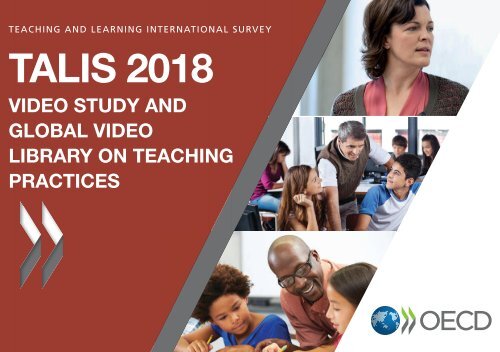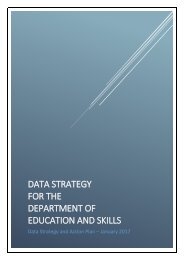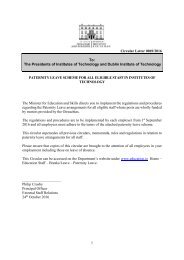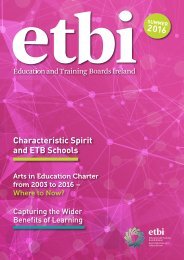Create successful ePaper yourself
Turn your PDF publications into a flip-book with our unique Google optimized e-Paper software.
TEACHING AND LEARNING INTERNATIONAL SURVEY<br />
<strong>TALIS</strong> <strong>2018</strong><br />
VIDEO STUDY AND<br />
GLOBAL VIDEO<br />
LIBRARY ON TEACHING<br />
PRACTICES
©John Nordahl<br />
We need to attract the best and brightest to join the profession. Teachers are<br />
the key in today’s knowledge economy, where a good education is an<br />
essential foundation for every child’s future success. This survey provides<br />
strong evidence that teachers are open to change and keen to learn and<br />
develop throughout their careers. At the same time, they need to take more<br />
initiative to work with colleagues and school leaders, and take advantage of<br />
every opportunity for professional development.<br />
Andreas Schleicher<br />
OECD Director of Education and Skills
• Over 100 000 randomly selected lower secondary teachers and their school leaders from over<br />
6 500 schools representing more than 4 million teachers from 34 countries and economies in<br />
2013. Over 40 countries to join <strong>TALIS</strong> <strong>2018</strong>.<br />
• The first and only international survey that focuses on the learning environment and the working<br />
conditions of teachers in lower secondary schools.<br />
• A collaborative endeavour between governments, an international consortium, the OECD and<br />
teachers’ unions.<br />
• It fills important information gaps in the international comparisons of education systems.<br />
• It offers an opportunity for teachers and school principals to have a say in education analysis<br />
and policy development in key policy areas.<br />
• It allows countries to compare themselves with other countries facing similar challenges, and to<br />
learn from other policy approaches.<br />
• The third cycle will take place across OECD and partner countries and economies in 2015-18<br />
with the first results to be published in 2019.
As countries look to improve their education systems, they inevitably begin to examine the quality of<br />
their teachers.<br />
The OECD Teaching and Learning International Survey (<strong>TALIS</strong>) asks teachers and principals about<br />
the teaching and learning conditions that research tells us improve teaching. The proposed<br />
international video study of teaching practices will allow us to go one step further, by looking directly<br />
into the classroom. It will pilot methodologies to capture real teaching practices and will significantly<br />
add to data, such as those collected through the <strong>TALIS</strong> survey, by providing insights from classroom<br />
observations in an internationally comparative fashion.<br />
The video study of teaching practices is undertaken as a pilot study with the aim of trialling the<br />
methodologies and examining the analytical insights from such data. It is expected to unfold over 3-<br />
4 years and to involve up to 9 countries or economies.<br />
Participation in the video study is possible at the national or sub-national level. For state-wide<br />
participation, the sample will be drawn from the country-wide population of lower-secondary<br />
schools. Participation at the sub-national level is also possible if only a selection of regions (states,<br />
provinces, etc.) in a country is interested in taking part in the video study. If so, the study’s sample<br />
will then be drawn from the lower secondary schools in the combined regions.<br />
To date, 8 countries and economies have signalled their intention to join the study, including Chile,<br />
China (Shanghai), Colombia, Japan, Mexico, Spain (Madrid), the United Kingdom (England) and the<br />
United States. The deadline to join the study is 11 April 2016.
What will the main focus of the study be?<br />
The aims of the proposed study are to get actual classroom data, as well as to trial new<br />
methodological approaches to advance the research on survey methods and enable analyses of<br />
teaching effectiveness to be made.<br />
This shall support policy makers in improving teacher policy by answering the following questions:<br />
• What are the similarities and differences in teachers’ practices within and between countries?<br />
• What are the aspects of good teaching?<br />
• How does teaching relate to students’ learning outcomes?
What evidence will be collected?<br />
The study will gather:<br />
• videos from two separate lessons in mathematics of a representative sample of 85 lower<br />
secondary teachers. The specific subject content that will be videotaped will be identical across<br />
countries and chosen by a group of experts from each participating country, following a<br />
mapping of the curriculum in each country;<br />
• pre- and post-tests of learning outcomes, using some items from the Programme for<br />
International Student Assessment (PISA) and augmented by additional original items aligned<br />
with the content taught during the videotaped lessons;<br />
• teacher and student surveys, which will be completed before and after the lessons and will<br />
include:<br />
• for teachers: questions about lesson organisation, planning, intended outcomes,<br />
reasons for instructional choices;<br />
• for students: questions about classroom organisation, and instructional and emotional<br />
support.<br />
• <strong>TALIS</strong> questionnaires for teachers and school leaders of the schools, together with other<br />
contextual information (such as lesson plans, homework, assessments, etc.).
How will the evidence be collected?<br />
The evidence collected as part of the video study will be based on:<br />
• international literature on teacher effectiveness;<br />
• a coding framework developed specifically for this study;<br />
• subject matter experts from each country;<br />
• a thorough validation process.<br />
To learn more about <strong>TALIS</strong> 2008 and <strong>TALIS</strong> 2013, see www.oecd.org/<strong>TALIS</strong><br />
• New Insights from <strong>TALIS</strong> 2013: Teaching and Learning in Primary and Upper Secondary Education<br />
• A Teachers’ Guide to <strong>TALIS</strong> 2013<br />
• <strong>TALIS</strong> 2013 Results: An International Perspective on Teaching and Learning<br />
• <strong>TALIS</strong> 2013 Technical Report<br />
• International database and users’ manual
What will be the study deliverables?<br />
The video study will yield:<br />
• An OECD comparative report with country-specific teaching profiles and effective teaching<br />
comparisons across countries. The report will improve the knowledge base on:<br />
• the degree of implementation of good teaching practices;<br />
• the relationship between teaching and student outcomes;<br />
• the national/regional teaching culture, among others.<br />
• Technical reports explaining the methodology and the video study coding framework.<br />
• A global video library of teaching practices that will showcase and disseminate videos of<br />
effective teaching practices around the world as a tool for peer learning. Videos will be:<br />
• available on line;<br />
• searchable according to a range of dimensions (education level, subject domain,<br />
pedagogical approaches, classroom composition, country);<br />
• subtitled in different languages;<br />
• easy to navigate.
Insights to be gained<br />
Given the methods and analysis plan proposed for the video study, the following kinds of<br />
policy-relevant insights from the study can be expected to be gained by each of the participating<br />
countries and economies:<br />
• better understanding of the national teaching culture, by itself, and in comparison to that of other<br />
countries;<br />
• better knowledge of the degree of implementation of often-praised teaching approaches;<br />
• better understanding of the relationship between teaching practices and student outcomes; not<br />
in terms of causal relationships, but in terms of effectiveness parameters estimated from<br />
sophisticated, longitudinal designs within and across countries;<br />
• better understanding of how context factors (teacher education, student composition, school<br />
types, teacher collaboration and professional development, evaluation and feedback practices,<br />
etc.) have an effect on classroom processes and student learning;<br />
• better understanding of the validity and policy relevance of findings from international surveys<br />
such as <strong>TALIS</strong> and PISA;<br />
• learning opportunities for teachers from observing their peers in action.
Provisional timeline
The OECD provides a setting where governments compare policy experience, seek answers to<br />
common problems, identify good practices and co-ordinate domestic and international policies. It<br />
brings together countries committed to democracy and the market economy from around the world<br />
to:<br />
• support sustainable economic growth;<br />
• boost employment;<br />
• raise living standards;<br />
• maintain financial stability;<br />
• assist member and non-member countries’ economic development;<br />
• contribute to growth in world trade.<br />
In today’s globalised economy, education is a major driving force for growth and development. The<br />
OECD Directorate for Education and Skills focuses on current key challenges facing education<br />
systems, including how to improve the quality of teachers, teaching and learning in order to provide<br />
the knowledge and skills needed in the 21st century.
For further information please visit our website:<br />
www.oecd.org/talis<br />
or contact us at:<br />
talis@oecd.org





